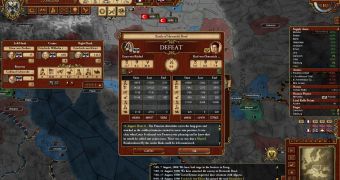The biggest problem in March of the Eagles is how to handle success, especially given the limited time available to take a nation to the top, about fifteen years, and the huge looming threat of the French behemoth.
Defeat is simple: you save as much of your troops as possible and offer peace as soon as possible, planning the quickest and most effective way of launching a devastating counterstrike after the truce expires.
But when I am winning, questions keep popping up in my head: should I push some more and gain some more ground? Do I need more troops to hold territory? Can I get away with another smaller war and still win both?
Initially, I was tempted to drag a war along for as much as possible, trying to get a complete victory over my enemies in order to grab as much territory as possible, or even annex them outright, a philosophy formed by years of playing Europa Universalis III and Victoria II.
But March of the Eagles is a much more focused experience, and it’s rarely worth taking everything you need from a country.
Because players need to win in just 15 years, by establishing domination on land or sea, each fight needs to go on long enough to secure the all-important victory provinces and not a year more.
Any additional time spent fighting means lost manpower and lost time, both better spent on planning for the next inevitable conflict.
So I now try to make peace as soon as I can and get limited amounts of land, while preserving as much of my own resources as possible.
The only problem is that the Artificial Intelligence in March of the Eagles is sometimes more stubborn than a human player might be, which means I had to conquer more than two thirds of the Ottoman Empire, as Austria just to get two regions I really needed.

 14 DAY TRIAL //
14 DAY TRIAL //